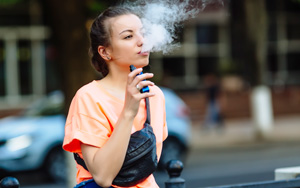
Vaping and e-cigarette resellers are all on edge with the deaths and illnesses that have reportedly been linked to them. Walgreens, Walmart, Kroger and Rite Aid are only some of the retailers that have decided to pull these products from their shelves. With the developing regulations in a growing number of states and municipalities, businesses are trying to stay out of it as much as possible.
The regulations and bans on flavored e-cigarettes come after over 1,000 lung injuries and 18 deaths related to these products have been reported across the country as of October 1st, according to the Centers for Disease Control & Prevention (CDC). The Trump Administration prepared to complete a ban on flavored e-cigarettes, with the details still in the works, but will for the most part remove flavored e-cigarettes and nicotine pods from the market, excluding tobacco flavors.
States Are Taking It Into Their Own Hands
Vaping is being steadily regulated across the U.S. and some states have even banned e-cigarette products. The Los Angeles Times reports that California Governor Gavin Newsom announced a $20 million, state-sponsored vaping awareness campaign to crackdown on and “reduce youth vaping consumption” back in September, but there is no statewide ban yet.
New York planned to begin enforcing a ban on vaping products on October 4th, but then came to a halt when the Appellate Division of the New York State Supreme Court stated that Governor Cuomo and his Health Department are prevented from enforcing the ban. For the time being, NY retailers may continue selling e-cigarettes.
Also in early September, Michigan became the first state to announce its intent to limit the sale of vaping products when Governor Gretchen Whitmer said she would issue an emergency ban on the online and retail sale of nicotine vaping products in any flavor except tobacco. On September 24th, Massachusetts Governor Charlie Baker announced the country’s strictest vaping ban yet: a four month, statewide ban on online and retail sales of all marijuana and tobacco vaping products, flavored or otherwise, according to Time. Rhode Island also banned the sale of flavored e-cigarettes in the state the day after Massachusetts’ ban was announced.
What Does This Mean for CBD?
The Trump Administration’s ban, however, is not planning to include cannabis or CBD e-liquids. Many patients have reported using cannabis-related products, but authorities have not ruled out this specific type of vaping just yet. The CDC, U.S. Food and Drug Administration (FDA) and other health organizations are continuing to study the issue.
Newsweek reported that marijuana is illegal under federal law, which makes it impossible for Congress or the FDA to pass any regulations around its use or sale, as they have with e-cigarettes and tobacco products. This means that there is no federal oversight when it comes to the manufacturing and sale of CBD and other cannabis derivatives.
Keeping An Eye Out
The companies who have chosen to stop selling e-cigarettes have chosen wisely to keep themselves out of murky waters and from having their own customers become sick from vaping. Even though the prohibition on e-cigarettes is still vague and incomplete on a federal level, it’s better to be safe than sorry and have to throw out all the vaping products that are on your shelves.
